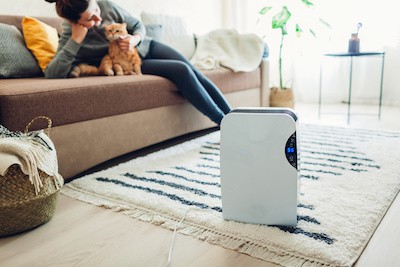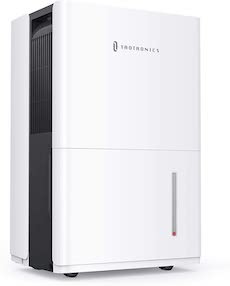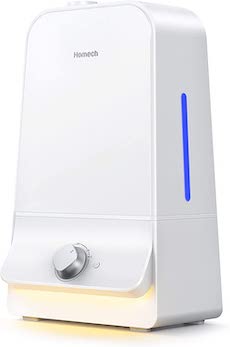Reasons to Use a Dehumidifier in the Winter
Have you woken up in the morning with a bloody nose durin the winter months? Are you wondering if there’s anything you can do to prevent this? This article will answer all of your questions about dehumidifiers and humidifiers and surviving the winter months without those nose bleeds and dry skin!
So, do you need a dehumidifier in the winter? Unless you live in a tropical or warm climate the answer is a resounding no. During the winter the air is normally dry. Dehumidifiers are used to pull moisture out of the air, meaning the air would be even drier. Instead of a dehumidifier, you should consider investing in a humidifier. They are used to add moisture to the air and prevent dryness – perfect for the winter!
What Is a Dehumidifier Used For?
Dehumidifiers are most useful in warm and muggy temperatures. Their job is to pull out excess moisture in the air, alleviating allergies and respiratory problems while improving air quality and avoiding mold buildup in your home.
Because they are designed for warmer temperatures, dehumidifier efficiency decreases as temperatures drop. It is recommended that they not be operated in temperatures below 60 degrees Fahrenheit. This is because the drawn-out moisture in the air can freeze and damage the unit.
Maintaining your dehumidifier is important, especially if you live in an extremely humid environment. The lifetime of dehumidifiers ranges from about 5 to 10 years. You can maximize this lifetime by regularly changing the air filters, cleaning the condensing coils and exhaust grills, and emptying/cleaning the water bucket.
You will know when it is time to replace your dehumidifier because the water bucket will stop filling up or it won’t run at all. When this happens and you look to replace it, consider recycling the old one – we should all take better care of our home!

When & Where Should You Use a Dehumidifier?
You should only use a dehumidifier in the warmer months – this will vary depending on where you live, but typically April-September. There will be signs, apart from your obvious discomfort and potential allergies, that you could benefit from using a dehumidifier.
If you have or notice any of the following items in your home, it would be good to invest in and use a dehumidifier.
- Water stains on the walls or ceiling
- High humidity in rooms with little to no ventilation
- Frequent condensation on the windows
- Small black spots growing on the walls
- Musty or mildewy smells
There are certain areas in homes and apartments that will typically require a dehumidifier more than others. These areas include bathrooms with no windows, small rooms with little to no windows, kitchens, and small apartments or basements. If you begin to use a dehumidifier in any of the previous areas of your home, you will likely notice an immediate difference and improvement in the air quality.
What is the Best Dehumidifier?
Choosing a dehumidifier will depend on the space in your home or local business where you plan to use it, as well as the humidity levels in that specific area. There are many different types: small capacity, heavy-duty, whole-house models, and even units with special features. The price range will also vary significantly depending on the type you choose.
Dehumidifier capacity is measured by the amount of moisture removed in a 24-hour period.
Small Capacity: designed for small rooms, 500-1,500 square feet.
Large Capacity: built for larger areas such as large rooms or basements, 2,000-2,500+ square feet.
Whole-House Models: good for houses if you live in a very humid environment, suffer from significant allergies, or have a large home
Special Features: some dehumidifiers have more bells and whistles that allow for the economic running of the unit – this can be helpful under certain circumstances and should be researched before purchasing.
TaoTronics Dehumidifier is one of the highest-rated humidifiers on the market it has 4.8 out of 5 stars on Amazon.

What Is a Humidifier Used For?
Humidifiers add moisture to the air, preventing dryness that causes irritation in the body. They are especially useful for treating dryness of the skin, nose, throat, and lips – as well as easing some symptoms caused by the flu or common cold.
Because humidifiers are used to treat dryness, they are typically used during the winter months and sometimes in the summer as the air conditioning is on high.
You should know, however, that overuse of humidifiers can potentially worsen some respiratory problems, so proper use is very important. Too much humidity can cause health problems and encourage the growth of dust mites, mildew, mold, and harmful bacteria.
It is recommended that humidity levels stay between 30 and 50 percent. This specific measure will keep the humidifier working properly, allowing your dryness symptoms to disappear quickly and effectively.
When & Where Should You Use a Humidifier?
Humidifiers are most useful during the winter when the air is dry. Sometimes they can be used in the summer when the air conditioning is on high – causing the air to be drier than normal.
You will have a good idea of whether or not you could benefit from a humidifier if you experience nose bleeds, wake up with a dry throat, have dry skin, and/or have chapped lips.
When thinking of where to put a humidifier so that it works most efficiently, there are some things to consider. You should first figure out where you need it most – which is most often in the bedrooms of your home. Once a location has been determined, you can then choose a size of humidifier that works best in those areas. Don’t overuse the unit! – then you’ll end up with too much moisture.
Different than dehumidifiers, humidifiers are sold by capacity – as in how much water they hold to dispel. This capacity is measured by the amount of moisture output over a 24-hour period. In the same way that you empty a water bucket with a dehumidifier, you have to fill the water bucket for a humidifier.
What is the Best Humidifier?
There are five different types of humidifiers: central humidifiers, evaporators, impeller humidifiers, steam vaporizers, and ultrasonic humidifiers. Every humidifier is classified as either console or portable/personal size.
Console humidifiers are designed to add moisture to the entire house and are very large. Portable/personal humidifiers are much smaller, designed to add moisture to one room/area, and are a great choice to take with you while traveling.
Central Humidifier: built directly into your home’s air conditioning/heating unit; most expensive, the best choice for adding humidity to the entire house. You will need a local HVAC company to install it.
Evaporators: blow moisture through a moistened filter; only work in one room at a time and can sometimes expel too much moisture into the air
Impeller Humidifiers: child-friendly and less expensive, only work in one room at a time
Steam Vaporizers: electrically powered, heat water and then cool it before expelling it into the air; most inexpensive and portable
Ultrasonic Humidifiers: produce a cool mist with ultrasonic vibrations; vary in price depending on the size; a good choice for children
The Homech Cool Mist Humidifier has a 4.7 out of 5-star rating on Amazon making it one of the highest-rated humidifiers on the market.
Related Questions
How do I know what size dehumidifier or humidifier I need?
The best way to decide what size dehumidifier or humidifier you need is to measure the size of the room and check the moisture level. Humidity meters are easy to find and will tell you the moisture level of the room. Most manufactures have the size of room or area that they cover listed as a description or on listed on the product packaging.
With a dehumidifier, it is better to go with one that is slightly larger than what you may need. In the same way, choosing a larger humidifier than you expect to need is better. However you will need to check the humidity levels daily to ensure you aren’t adding too much moisture to the air. Most models will allow you to dial back the amount of humidity if you are adding too much.
What happens if I don’t empty the water bucket in my dehumidifier?
Sometimes our lives get busy and we forget to do simple things like emptying out the water bucket in our dehumidifiers. If this happens, it’s not that big of a deal; however, the unit will stop running once it is full. There is also a possibility that the lifespan of your dehumidifier will be shortened if this happens consistently.
How often should I expect to empty the water bucket in my dehumidifier?
You should expect to empty the water bucket in your dehumidifier daily. If you have a smaller dehumidifier and the humidity levels are much higher, you may even be emptying out the bucket more than once. The good news is that this is not a difficult task. You will likely not have to worry about forgetting as the device will shut off once the bucket is full. If the unit shuts off, you will likely notice right away and remember to empty the bucket so that it starts running again.

